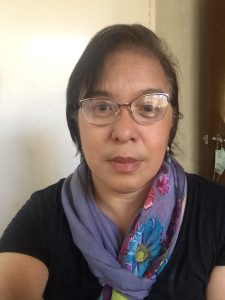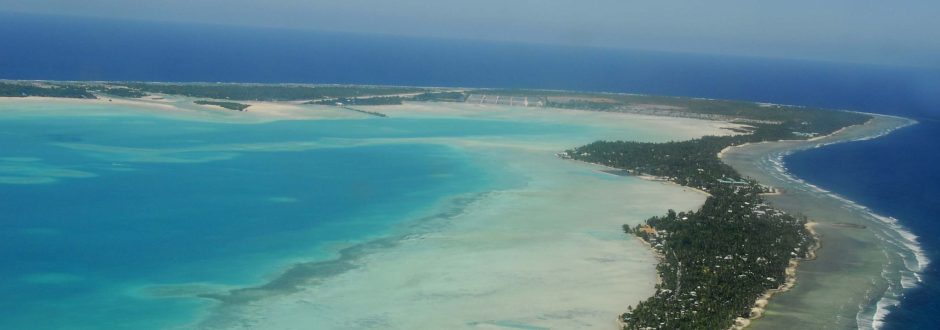South Tarawa Atoll in Kiribati. Photo taken by Government of Kiribati employee
Two respected community leaders will address the Chapter of Affairs Gathering on July 25 as the Sisters of the Good Samaritan discern a new phase in their Congregation’s life and mission.
Dr Estela Padilla is a leader in the theory and practice of helping communities to integrate their faith into everyday life in the Philippines and Anote Tong is the former President of Kiribati who continues to play a leading role in addressing the impacts of climate change on Pacific Island nations.
“When you are confronted with a particular situation, the first step is to see – look at it, discuss it. Then to discern, through Scripture and other writings, then to act – informed by what you see and discern.” Dr Estela Padilla on the Basic Ecclesial Community Approach
She is a Doctor of Theology with more than 40 years of pastoral work among parishes and dioceses in the Philippines and abroad. She is the Executive Secretary of the Office for Theological Concerns of the Federation of Asian Bishops’ Conferences (FABC) and the first woman and lay member to hold this position.

Dr Estela Padilla. Image supplied.
Dr Padilla is also a founding member of the Bukal ng Tipan organisation, which empowers local church communities through pastoral skills and leadership training towards a vision of a participatory church in the world. (Bukal means spring, Tipan means covenant.)
Her work is grounded in the Basic Ecclesial Community (BEC) approach. Bukal ng Tipan works with local dioceses to improve their planning processes to involve community members in their vision and mission, and their pastoral work.
“In the Philippines the churches really took seriously what Pope Francis wanted for the synodal processes – to visit those at the margins, not just those who are very active in church life, but also those you do not see in the church, for example public utility vehicle drivers, construction workers, laundry women, among others,” Dr Padilla said.
“I’m inspired by Pope Francis’s message – ‘let us organise hope’. For me this means we don’t just have wishes and dreams, but it involves a lot of shared work and shared purpose.
“God does not speak in a dark room; God speaks in what is happening around us. Always start from your experience, always encounter one another in the way God speaks or what God wills – it’s a communal discernment – by listening to one another, and then acting on it.
“In Asia we have become known for three-fold dialogue: Dialogue with cultures – because Asia is so diverse; Dialogue with religions (Christianity is so small, we are only 1 per cent) and Dialogue with the poor. But to us, dialogue does not mean just to talk – it means to live in harmony with our neighbours.
“As a pastoral worker and community organiser, I always want to look for tools that can help us move forward.”
“I just came back from working with a religious community in the Philippines – they work with the poorest of the poor, and their mission is to be present where there is great suffering. I really admire that, but as a pastoral worker, I feel there should be more than ‘presence’.
“Poverty is systemic, it’s not something to accept or just be ‘present’ with, but to get people out of poverty takes a lot of work. So we’re helping this community to develop skills to collaborate with other like-minded organisations, to help the poor.“
“This is what happened in the (Old Testament) floods – only Noah would listen to the warnings of God, and here (with climate change) it’s the same thing, no one is listening. But it’s very clear to me, that unless we do something it will be the greatest disaster.” Anote Tong
Anote Tong was the President of the Federation of Kiribati from 2003-16 and was twice nominated for the Nobel Peace Prize. As president he was responsible for drawing international attention to the human dimension of climate change and for declaring what was then the largest UNESCO World Heritage site, the Phoenix Islands Protected Area (PIPA), which his government called a gift to humanity.

Former President of Kiribati Anote Tong. Image: Sam Beebe/CC BY 2.0.
Anote believes that climate change is the greatest moral challenge facing humanity, that’s why he met Pope Francis in 2015 to discuss climate change and the environment. “I had to go to a higher moral authority,” he said, because some church leaders didn’t accept what the scientists were saying about the dire impacts of climate change. “We need moral guidance to have a proper perspective of what is at stake.”
As a Pacific Elder, Anote is a member of several UN Commissions, including the Climate Overshoot Commission, which will report later this year on progress nations are making to meet and exceed their Paris commitments to reduce greenhouse gas emissions.
He is not optimistic that countries like Australia will reduce emissions enough and said Pacific Islanders must face the reality in the scientific reports by the Intergovernmental Panel on Climate Change (IPCC) that climate impacts, such as rising sea levels and more severe storms, are hitting the Pacific harder and much sooner than predicted.
“We know it’s happening, let’s not pretend that it’s not happening,” he said. “Putting aside the emotions, I’ve been through that, and it’s not an easy thing to come to terms with, but you have to come to terms with it. If we are to survive as a people and as a nation then we must look at options including geo-engineering, and ‘migration with dignity’.”
“I’ve always believed that given our geography, the structure of our islands – we don’t have a lot of space to deal with the impacts of climate change and any adaptation will have to be across borders.
“They’re not all mutually exclusive, I’ve tried to keep (open) the option of raising the islands if we can but at the same time, let’s consider as a fall-back option the possibility of migration. And if there is to be any migration, which I believe will be inevitable, let’s do it with some degree of dignity.
Anote said this was about ensuring the safety and guaranteeing the security of future generations. “We’ve got to be brutally realistic. We have to have a good understanding of the IPCC reports that are coming out and be able to extrapolate them into the future, and so far, the future looks terrible.
“For any hope of a safe future for the people of the Pacific we’re going to need some extremely moral leaders in Australia and New Zealand, and in the global community.”
Story originally published in The Good Oil June 2023 here
